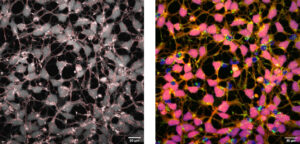The manifestation of Parkinson’s disease (PD) and the age of onset are not exclusively determined by the mutation identity, for instance in the LRRK2 gene. So far, only few factors have emerged, which define disease penetrance or constitute signs of advanced progression in LRRK2-PD. By contrast, in fibroblasts from manifesting and non-manifesting G2019S mutation carriers, we detected a correlation between mtDNA deletions and disease status (Ouzren et al., Ann Neurol, 2019). Furthermore, cells from manifesting G2019S carriers had impaired complex I function as well as increased mitochondrial mass and mtDNA copy number, suggestive of impaired mitophagy. Finally, elevated expression of Nrf2 implicates ROS scavenging in the penetrance of LRRK2-PD (Delcambre et al., Front Neurol, 2020). Thus, we now speculate that in manifesting G2019S mutation carriers increased LRRK2 kinase activity interferes with Nrf2 antioxidant signaling, which in turn (i) promotes mtDNA damage, (ii) mediates ccf-mtDNA release, and eventually (iii) triggers pro-inflammatory signaling. We are exploring this hypothesis in patient iPSC-derived neurons and microglia. Of note, iPSC-derived microglia from G2019S mutation carriers exhibit higher levels of pS1292 LRRK2, a known pathogenic form of phosphorylated LRRK2, and these levels are accompanied by significantly higher levels of pRab10, a known LRRK2 target.
Our findings further strengthen the role of LRRK2 kinase activity in the pathogenesis of PD. We are currently investigating the therapeutic kinase inhibitor MLi-2, with or without inflammatory stimuli, to study the role of kinase activity in inflammatory processes. In addition, we investigated how environmental toxins may interfere with the penetrance of the G2019S mutation (Lüth et al., Front Aging Neurosci, 2020).
This project is part of the Research Unit “ProtectMove”, which is co-funded by the Luxembourg National Research Fund (FNR) and the German Research Foundation (DFG).
